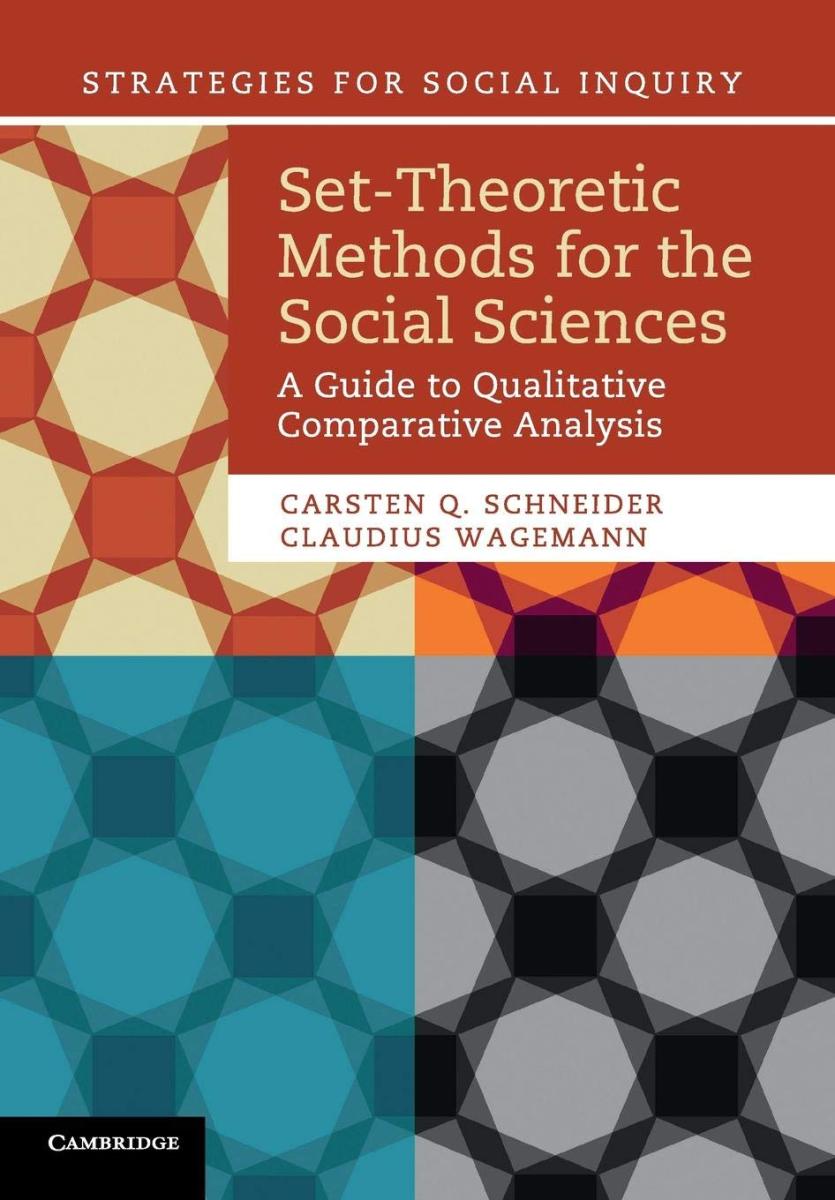
Qualitative Comparative Analysis (QCA) provides a bridge between case-oriented and variable-oriented research methods. It is rapidly making inroads in the social sciences.
This course is designed for participants who have experience in qualitative or quantitative research and who are interested in applying qualitative comparative analysis (QCA) in their current or future studies.
The Course is a mix of lectures and exercises. By the end of this Course, you will be able to carry out a full QCA application (both crisp set and fuzzy set) using dedicated QCA software. In class, we use both crisp set QCA (csQCA) and fuzzy set QCA (fsQCA) examples.
This course runs over 4 days, 2:00-8:00pm Australian Eastern Standard Time, UTC +10
Please note there is a dinner break from 5:00-6:00pm
See syllabus below for a detailed timetable.
Optional: If you already have QCA-ready data, or data that you hope can be transformed to be QCA-ready, then please make sure to have it handy for the course. Jeroen offers an optional 5th day to this course for those who would like to analyse their own data under Jeroen’s supervision. Please reach out to ACSPRI if you are interested in this option.
Professor Jeroen van der Heijden – With 20+ years of international research experience, Jeroen specializes in climate change solutions for urban environments, encompassing both mitigation and adaptation strategies. His journey includes an MSc in Architecture and Ph.D. in public administration from TU Delft (Netherlands) and academic roles at institutions worldwide, including professorships at the Australian National University (Australia), Amsterdam University (Netherlands), and the Victoria University of Wellington (New Zealand). He has authored over 80 peer-reviewed articles, 70 book chapters, and notable books on urban climate governance and action—many of which include applications of QCA.
Since 2007, he has been applying QCA in various research projects and has been teaching the method since 2017. More information on Jeroen’s work is available from www.jeroenvanderheijden.net.
This is a level 3 Course. In it, we will go through the 10 steps of a full QCA project:
- Explaining the theoretical motivations for choosing QCA for your project
- Selection of outcomes and conditions
- Explaining the limitations that come with the number of conditions chosen
- Calibration of data
- Develop a raw data matrix
- Analysis of necessary conditions
- Analysis of sufficient conditions: truth table
- Analysis of sufficient conditions: choice of solution term
- Presentation of results
- Testing robustness and interpretation of results
By the end of the course, you will be able to carry out a full QCA (crisp set and fuzzy set) and present it to an audience of expert QCA users as well as a lay-audience. There is ample time reserved in this course to carry out full QCA analyses under your instructor’s supervision.
The target audience for this course are researchers, practitioners and academics who have conducted at least one qualitative study and are familiar with the process and context of qualitative research.
Day 1
- 2:00-2:30, Introductory session:
- Who is who? Why have you chosen this course? What do you expect to get out of it?
- What are we going to do over the next two days? What are we not going to do?
- 2:30-3:30, Epistemological foundations of QCA:
- What are the epistemological foundations of QCA?
- Where is QCA positioned in relation to case-oriented and variable-oriented research?
- 3:30-5:00, Exercise
- The essence of QCA: logical minimization (and truth tables)
- To get an understanding of the very basics of QCA, we will carry out a QCA analysis by hand.
- Once we get the basics of QCA, we will explore data with an Excel add-in.
- 5:00-6:00, Break
- 6:00-6:30, Step 1: Motivating your choice of QCA: Conjunctural causation, equifinality, (data) asymmetry
- What is conjunctural causation? What is equifinality? What is (data) asymmetry? Where do we see it in the world?
- Whether/ where do you expect conjunctural causation, equifinality, and/or (data) asymmetry in your field of research?
- 6:30-7:30, What can QCA be used for?
- Data analysis, literature reviews, theory building, case selection, robustness tests
- 7:30-8:00, Your thoughts and questions on QCA as a method
- Crisp set(cs) and fuzzy set (fs) QCA
- Open discussion, recap of the basic terminology and concepts
Day 2
- 2:00-3:00, What have we learned so far?
- Exploring more datasets using the excel add-in
- 3:00- 3:30, Step 2: Selection of outcomes and conditions
- How "easy" is it to use QCA? A discussion about outcomes and conditions
- Jeroen's experiences with using QCA in small and multi-year research projects
- 3:30-4:30, Step 3: Reflecting on the limitations that come with the number of conditions chosen
- Some of the most common challenges when applying QCA (and how to deal with them)
- Is the number of cases you have all that matters?
- How many conditions can be included in the theoretical model?
- What is limited diversity and what to do about it?
- 4:30-5:00, Open discussion
- What questions have already come up about the method?
- 5:00-6:00, Break
- 6:00-7:00, Step 4: Calibration of data
- What is data calibration? Why is it so important (and often time consuming) in QCA?
- How to calibrate your data (for csQCA and fsQCA)
- 7:00-8:00, Open Discussion, calibrating your own data
- Good practice to follow (a guideline)
- What challenges do you expect to encounter in calibrating your own data?
- What are your hopes and concerns in applying QCA?
Day 3
- 2:00-3:00, Step 5: From data to raw data matrix
- What is the raw data matrix used for?
- Reflection on necessary, sufficient, INUS and SUIN conditions
- what do all these terms mean?
- How do you think necessary, sufficient, INUS and SUIN conditions will play out in your work?
- 3:00-4:00, Step 6: Analysis of easy conditions
- What is the aim of analysis of necessary conditions?
- Exercise: analysis of necessary conditions in fs/QCA 4.1 (Windows and Mac software)
- Interpretation of findings (consistency, coverage, trivial necessary conditions)
- 4:00-5:00, Step 7: Analysis of sufficient conditions - truth table
- What is a truth table?
- Exercise: create a truth table in fs/QCA 3.0 (Windows and Mac software)
- Dealing with conflicts
- Dealing with logical remainders
- 5:00-6:00, Break
- 6:00-7:00, Step 8: Analysis of sufficient conditions - choice of solution term
- What is the aim of the analysis of sufficient conditions?
- Complex solution, intermediate solution, parsimonious solution
- Reflection on logical remainders and counterfactuals
- Exercise: analysis of sufficent conditions in fs/QCA 4.1 (Windows and Mac software)
- Interpretation of findings (consistency, coverage, trivial necessary conditions)
- 7:30-8:00, Open discussion
- Reflection on Apply steps 6, 7 and 8
Day 4
- 2:00-3:00, recap of Step 6, 7 and 8
- Exercise: carry out the analysis of necessary conditions and the analysis of sufficient conditions with fuzzy data (provided by Jeroen)
- 3:00-4:00, Open discussion
- Now that we have gone through the major technical steps of QCA, what challenges do you expect to encounter in your own projects? How will you address them?
- 4:00-5:00, Step 9: Presentation of results
- Exploring different ways to present findings
- 5:00-6:00, Break
- 6:00-7:00, Step 10: Testing robustness and interpretation of results
- Some thoughts on assessing the robustness of your QCA results
- 7:00-8:00, Final lecture and open discussion about applying QCA in your work
- Where to find QCA good practice guidelines
- How to deal with reviewers' comments
- Ongoing development of QCA and critique
- Combining QCA with other methods
Day 5
- One to one consultation and review
This master class will take place online.
It is expected that participants familiarise themselves with the QCA software (freeware) we will use in class in preparation for this course. This software, fs/QCA 4.1, is available from: http://www.socsci.uci.edu/~cragin/fsQCA/software.shtml
We will also be using an MS Excel add-in during this course.
Participants will be expected to have experience with at least one qualitative research project or have undertaken an introductory level course in qualitative research methods. While some discussion of the technical elements of methods is presented during the course, participants should have a basic familiarity with data collection methods such as interviews, observation, and document analysis.
- The instructor's bound, book length course notes will serve as the course text.
- Schneider, C. and C. Wagemann (2012). Set-Theoretic Methods for the Social Sciences. Cambridge, Cambridge University Press.
Other readings:
- Mello, P. (2022). Qualitative Comparative Analysis: An Introduction to Research Design and Application. Washington: Georgetown University Press.
- Ragin, C. (2008). Redesigning Social Inquiry: Fuzzy Sets and Beyond. Chicago, Chicago University Press.
- Rihoux, B. and C. Ragin (2009). Configurational Comparative Analysis. London, Sage.
- van der Heijden, J. (2017). Innovations in Urban Climate Governance: Voluntary Programs for Low-Carbon Buildings and Cities. Cambridge, Cambridge University Press.
Q: Do I have to have had any qualitative research experience to do this course?
A: Yes, you will have been expected to have experience with at least one qualitative research project, or have undertaken an introductory level course in qualitative research methods.
Q: Do I have to have had any experience with QCA to do this course?
A: No, but it is strongly recommended to familiarise yourself with the recommended texts before participating in this course; particularly Schneider and Wagemann (2012).
Q: I already have some experience with QCA. Will I get anything out of this introductory course?
A: You absolutely will. Prof
Professor Jeroen van der Heijden – With 20+ years of international research experience, Jeroen specializes in climate change solutions for urban environments, encompassing both mitigation and adaptation strategies. His journey includes an MSc in Architecture and Ph.D. in public administration from TU Delft (Netherlands) and academic roles at institutions worldwide, including professorships at the Australian National University (Australia), Amsterdam University (Netherlands), and the Victoria University of Wellington (New Zealand). He has authored over 80 peer-reviewed articles, 70 book chapters, and notable books on urban climate governance and action—many of which include applications of QCA.
Since 2007, he has been applying QCA in various research projects and has been teaching the method since 2017. More information on Jeroen’s work is available from www.jeroenvanderheijden.net.
Prof Jereon was amazing at delivering the contents and making everything super clear. The content was arranged to be demanding but manageable.
It is a well designed course.
The course was excellent - well paced, targeted, relevant. The presenter was friendly, very knowledgeable and gave participants lots of opportunity to ask questions.
I feel very confident I can undertake a QCA study now. Jeroen showed us how and also ensured we understood what we were doing and why.
I fully enjoyed the course and the presenter
The instructor's bound, book length course notes will serve as the course text.
